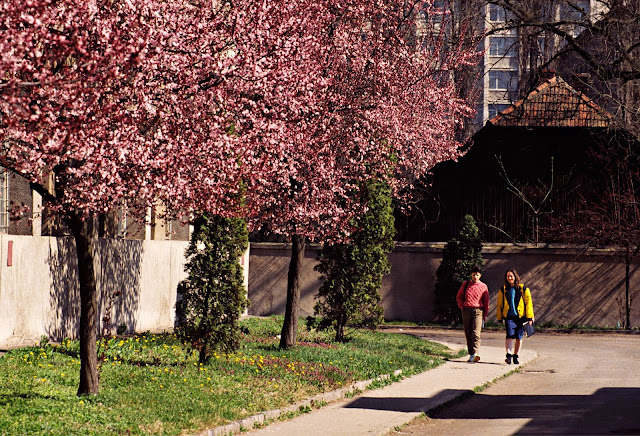 |
A blue Lada wears a bouquet of flowers in honor of
spring.
|
Spring came early to Eastern Europe
that year of 1990, as if nature herself wished to help atone for the sins of
winter.
 |
Lovers and fishermen on the banks of the Bega.
|
In Timisoara, forsythia bloomed in abundance and lovers and fishermen lined the banks of the Bega, while in the bright sun of a March morning worshipers hurried up the steps of the Romanian Orthodox Cathedral, steps where only three months before soldiers under orders from the dictator Ceausescu had fired on children.
 |
The steps of the Romanian Orthodox Cathedral
where children were fired upon.
|
I haven't been able to find mention of this in historical accounts of the tragedy, but I was told by the people at Timisoara that 47 children dressed in their finest clothes carried candles up the steps of the cathedral in a memorial service and were fired upon by Ceausescu's men at his command.
 |
A shrine to one of the victims of the massacre.
|
Flowers and shrines now covered the places where young blood once stained the earth.
 |
Flowers and candles make an impromptu
shrine in front of the cathedral.
|
But spring had come now, and the taste of freedom was like wine in the air as Timisoarans thronged Victory Plaza, the place where the previous December, they had gathered to protest oppression. Missing on this beautiful day were the ones who had been cut down by cannon and machine gun fire by the army and secret police.
 |
Crowds enjoy the taste of freedom and the
warmth of early spring at Victory Plaza.
|
On Saturday, March 17, Louise and I were up early and off to the airport, where after much confusion over our boarding passes, we managed to catch our flight to Timisoara, about 300 miles to the west. Paul Lauster remained in Bucharest to take care of some denominational business.
In Timisoara we were met by two Romanian pastors whose faces fell when they learned I was not a preacher from America! They recovered, though,
and one of them took us to his home, where we finally had a late but delicious breakfast prepared by his wife. After checking into our hotel, Louise took the afternoon off
to catch up on her rest and I set out on foot with Gelu, one of the pastor's
sons as my guide.
 |
The university campus at Timisoara.
|
Crossing the Bega twice on
different bridges on our walk, we passed the Romanian Reformed Church, whose
pastor, Laszlo Tokes is considered the father of the Romanian revolution, went
through the university campus, visited Victory (formerly Opera House) Plaza,
and the memorials in front of the Romanian Orthodox Cathedral.
 |
The Romanian Reformed Church, where pastor
Laszlo Tokes, "the Father of the Romanian
Revolution" began the protests that ultimately
brought down the government.
|
As I wrote in a post several years ago, it was on this walk that I missed one of the greatest opportunities of my career. Before the horror of the Romanian orphanages became known to the world, Gelu and I came upon a large building whose grounds were enclosed with bars and walls. There were many children standing around or playing behind the bars, and some came over to watch us. "What's that?" I asked Gelu. "An orphan asylum," he replied. "Oh, okay," I said, and turned away to photograph an attractive pattern of shadows playing on a window across the street. Some months later, someone else broke the story of the Romanian orphanages. It could have been me. But it wasn't.
 |
An ancient window in Timisoara. A lovely
photograph and a missed opportunity.
|
But of course, we didn't know any of that at the time. After a delicious supper, we were off to a service at the Elim Church of God, a new and unusually large building with two levels of balconies. There was a brass band on the top balcony above the pulpit!
 |
The large, new Elim Church
of God. Packed,
as were all churches on our tour.
|
(Photographs
made with Olympus OM and Leica M cameras and
lenses, Fujichrome 100D and 400D films.)
No comments:
Post a Comment